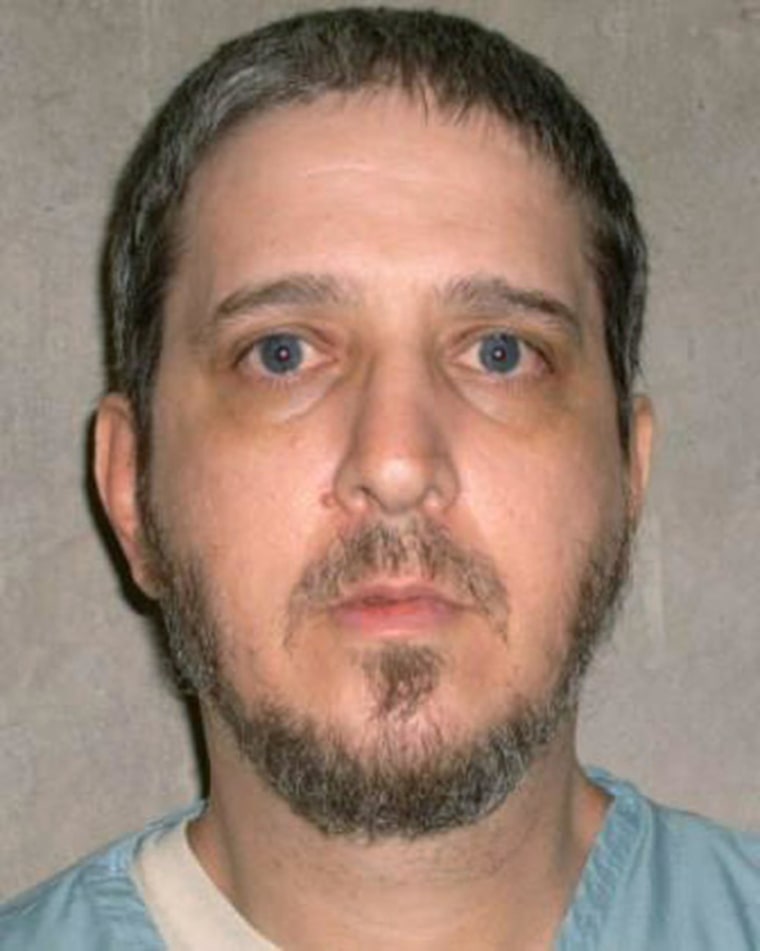Oklahoma's attorney general on Thursday asked a court to delay all scheduled executions while the state reviews how it received the wrong drug as it prepared to lethally inject an inmate.
Attorney General Scott Pruitt said Oklahoma needed time to sort out why its Department of Corrections received a shipment of potassium acetate rather than potassium chloride for Richard Glossip's execution that was to occur Wednesday. Pruitt's move came hours after Gov. Mary Fallin said she was confident the state could resolve its problems in time for an execution set for next week.
"The Office of the Attorney General needs time to evaluate the events that transpired on Sept. 30, 2015, ODOC's acquisition of a drug contrary to protocol, and ODOC's internal procedures relative to the protocol," Pruitt's office said in its request to the state Court of Criminal Appeals.
Pruitt asked for an indefinite stay.
Related: Oklahoma Governor Halts Richard Glossip Execution at Last Minute
Benjamin Cole is set for execution Oct. 7 and John Marion Grant on Oct. 28. Glossip is now scheduled to die Nov. 6.
State officials said they became aware Wednesday that Oklahoma's drug supplier had shipped it potassium acetate rather than potassium chloride, the third of three drugs administered under the Department of Corrections' guidelines. State protocols adopted following the flawed execution of Clayton Lockett last year directed that the warden of the Oklahoma State Penitentiary "verifies execution inventory" two days prior to an execution.

"Certainly it raises a lot of the same questions raised by the Lockett execution, which is whether this department is competent to carry out its own procedures," said Jen Moreno, a staff attorney with the Death Penalty Clinic at the University of California's Berkeley Law School. "Minutes before the execution is supposed to start, that's when they realize they don't have the right drugs?"
Oklahoma had planned to execute Glossip, 52, whom prosecutors said arranged for a handyman to kill their boss, motel owner Barry Van Treese, at the Best Budget Inn in Oklahoma City on Jan. 7, 1997. Fallin granted a stay of execution about an hour after the U.S. Supreme Court had cleared the way for the punishment to move forward by rejecting Glossip's claim that the handyman had set him up.
Related: Oklahoma's Richard Glossip Is Nun's 7th 'Dead Man Walking'
"She's extremely frustrated that the state was unable to deliver closure to the Van Treese family," Fallin spokesman Alex Weintz said Thursday. "The family has certainly waited long enough for justice and has been through the wringer with this entire process."
After Lockett writhed on a gurney and struggled against his restraints during his execution on April 29, 2014, prison officials concluded that an intravenous line at Lockett's groin wasn't properly set and he didn't receive a full dose of deadly chemicals. It rewrote its guidelines and assured federal courts from Oklahoma City to Washington that its procedures were sound.
"That new protocol came out last September," Moreno said. "For one year, this department has said they have fixed their problems and they have everything together and they're prepared and they've reviewed and changed and made revisions, and then this happens."
The Oklahoma Board of Corrections was gathering for a previously set meeting Thursday in McAlester. Corrections Director Robert Patton was expected to discuss Glossip's case with the panel.
Fallin's office said corrections officials discovered the drug mix-up Wednesday morning, and then her office, the attorney general and prison officials discussed what to do in the afternoon. Separately, the U.S. Supreme Court was weighing Glossip's plea for a hearing based on claims that his co-defendant had lied.
As the hours passed, it wasn't clear whether Oklahoma tried to find the correct drug — the death warrant was good until midnight — or whether it was waiting for the Supreme Court to grant Glossip a reprieve. An hour after justices said the execution could continue, Fallin issued a stay so the state could look into whether potassium acetate could be used as a substitute or whether a batch of potassium chloride could be found.
Fallin, at a Capitol news conference in Oklahoma City on another topic, said she wasn't ready to talk about her level of confidence in the prisons department.
"I don't think we should be pointing fingers right now because we don't have details about who did what," Fallin said. "What we do need to make sure is that we have the protocols in place, that we follow those protocols and that we make sure that we uphold the law."